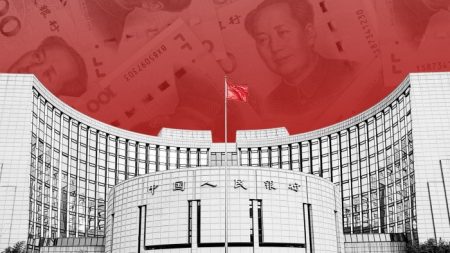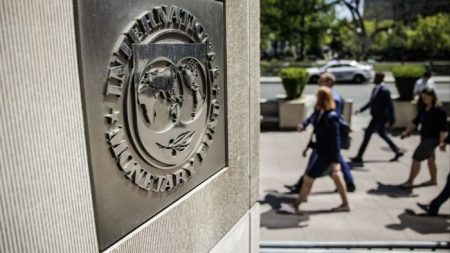The global economy is at risk of stagnating in the coming years — and America’s robust economic strength may not be enough to save it.
“Without a course correction, we are indeed heading for ‘the Tepid Twenties’ — a sluggish and disappointing decade,” Kristalina Georgieva, the International Monetary Fund’s managing director, warned a few weeks ago.
A lackluster performance in Europe and lukewarm growth in China (despite solid first-quarter data) are partly to blame. The good news is that despite major economic hurdles in recent years such as geopolitical conflict and high interest rates, a global recession isn’t in the cards. The bad news is that weak growth will leave many people feeling poorer.
The solution: Policymakers around the world need to tackle a slew of economic issues, the IMF chief said.
Invigorating growth is critical: When the economy expands, it improves standards of living, promotes innovation and makes households wealthier. That reality is slowly slipping away for the 20-nation eurozone, where growth has been flat. There are fears, currently, of an outright contraction if the European Central Bank doesn’t cut interest rates soon.
The situation hasn’t been a whole lot better in China. Last year, the world’s second- largest economy grew at its weakest pace in decades, bogged down by high youth unemployment and a floundering property sector. (First-quarter GDP figures suggest a recovery might have begun earlier this year.)
That’s in stark contrast to the United States, where growth has been vigorous thanks to strong consumer spending and gains in productivity. America’s economic strength is precisely why the IMF last month revised its forecast for global economic output up to 3.2% from the 2.9% projected back in October.
Several countries, including the US and some in the eurozone, benefited from expanding labor forces in 2023, with immigration playing a key role, in addition to “sound macroeconomic fundamentals built over the last years,” Georgieva said. Economic growth in Spain and France was stronger than expected last year.
But the US is outperforming mainly for one key reason: Robust productivity growth.
US labor productivity, which is essentially how efficient workers are at producing goods and services, surged in 2023 after declining in the prior year.
It remains to be seen whether or not that momentum will continue. Productivity growth came in well below expectations in the first three months of the year, according to Labor Department data released last week. That worker efficiency has been a tailwind unique to the United States, economists say.
“Productivity has been one big factor, and, compared to other countries in Europe, there are also cultural differences when it comes spending,” Stephen Gallagher, US chief economist at Societe Generale, told CNN.
Americans have been on a spending spree these past few years, fueled by a solid job market and savings that got beefed up during the pandemic. Even though the American economy isn’t running at the same red-hot pace as in 2021, US consumers have continued to spend at a solid clip, in turn fueling growth. Consumer spending accounts for about two-thirds of US economic output.
Gallagher said that Americans are more likely to spend any excess savings, whereas in European countries, people are “just more likely to hold on to their savings.”
Another key difference buoying the US economy over the eurozone’s is the country’s energy sector, Gallagher said. Unlike the eurozone, the US doesn’t rely heavily on imports for its energy supply. Europeans pay far more for energy than Americans do, and it becomes even costlier when geopolitical conflicts threaten supply, such as the ongoing Russia-Ukraine war and flaring tensions in the Middle East.
A “course correction” isn’t an even stronger US economy: Economic policymakers around the world need to address a range of key issues.
“At this juncture, policymakers face a choice. They can avoid difficult decisions and try to muddle through with less-than-good polices or they can make another choice,” Georgieva said. “They can … choose good policies: deal decisively with inflation and debt; and promote economic transformation to boost productivity, inclusion, and sustainable growth.”
“What we need is the ‘Transformational Twenties’,” she said.
Turkey has halted all import and export transactions with Israel in protest over the war in Gaza, report my colleagues Hande Atay Alam and Olesya Dmitracova.
“All import and export transactions related to Israel, including all products, have been stopped,” Turkey’s trade ministry said in a statement Thursday. “Turkey will strictly and decisively implement these new measures until the Israeli government allows an uninterrupted and sufficient flow of humanitarian aid to Gaza.”
A senior member of Israel’s government accused Turkish President Recep Tayyip Erdogan of breaking trade agreements “by blocking ports for Israeli imports and exports.”
“This is how a dictator behaves, disregarding the interests of the Turkish people and businessmen, and ignoring international trade agreements,” Israeli foreign minister Israel Katz posted on X Thursday.
Turkey-Israel trade was worth $7 billion last year, according to official data. Israel was among the top 20 destinations for Turkish exports, buying goods and services worth $5.4 billion. According to Reuters, top Turkish exports to Israel are steel, vehicles, plastics, electrical devices and machinery.
Read more here.
Monday: Earnings from Palantir Technologies, Tyson Foods and Marriott Worldwide Vacations. New York Fed President John Williams delivers remarks.
Tuesday: Earnings from Disney, BP, UBS, Duke Energy, McKesson, Suncor Energy, Celsius, Reddit, Lyft, Dutch Bros, Squarespace and TripAdvisor. Minneapolis Fed President Neel Kashkari delivers remarks.
Wednesday: Earnings from Toyota, Uber, Anheuser-Busch InBev, Airbnb, Shopify, Fox Corporation, News Corporation, Duolingo, Icahn Enterprises, New York Times Company, Sunoco, Valvoline, The Cheesecake Factory, Compass, AMC Entertainment and Beyond Meat. China’s customs agency reports on the country’s trade surplus in April. Fed Governor Lisa Cook delivers remarks.
Thursday: Earnings from Honda, Warner Bros Discovery, Warner Music Group, Hyatt Hotels, Tapestry, Dillard’s, H&R Block, Planet Fitness, Hilton Grand Vacations, Sweetgreen, Krispy Kreme, Six Flags and Papa John’s. The Bank of England announces its latest interest rate decision. The US Labor Department reports the number of new applications for unemployment benefits in the week ended May 4.
Friday: The United Kingdom’s Office for National Statistics releases first-quarter figures on gross domestic product. The University of Michigan releases its preliminary reading of consumer sentiment in May. Chicago Fed President Austan Goolsbee delivers remarks. China’s National Bureau of Statistics releases May inflation data.
Read the full article here













